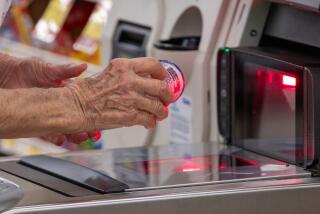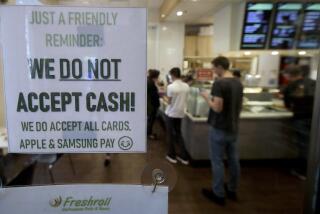There’s More to Cashiering Than Pushing Buttons
- Share via
Richard Harding’s students at Glendale Community College, many of them supermarket stock clerks, are hungry for the higher salaries and status that come with working behind a cash register. So they pay attention when he cautions them that there is a lot more to being a cashier than just pushing keys and making change.
A good supermarket cashier, he said at a recent class, also has to handle taxes and checks, coupons and food stamps, refunds and specials, scales and carriages, shoplifters and scam artists, unruly customers and the ones who simply want to know whether tomato sauce is near the ketchup, canned vegetables or pasta.
A good cashier has to spot the difference between a McIntosh and a Delicious apple, between a real $20 bill and a phony and between a magazine that is taxable and one that is not. A cashier has to keep customers informed about bargains and the boss aware of cash flow. And a good cashier has to know how to react during a robbery.
Even in these days of electronic checkout scanners, he said, there is a lot to master, all of it to be done with accuracy, speed and a smile.
Public Relations Man
“You are the store’s No. 1 public relations man,” he announced at the non-tuition grocery cashiering course he has been teaching for five years at the college’s Adult Division.
The current class, 22 women and four men, most of them under 30 years old, took careful notes. Competition for advancement from boxer to cashier is fierce, they said. That’s why they are going to college to learn the ins and outs of a job not normally associated with higher education.
Cashiers’ wages start at $7.08 an hour and can rise to $11.80, contrasted with the $4 an hour starting pay and $4.50 maximum for a box boy, under the current union contract with major supermarket chains.
Most major chains have their own training, but taking a course from a veteran like Harding shows extra initiative and improves a student’s odds of succeeding on the job, store and union officials said.
“It puts them one step ahead so they won’t be scared stiff,” said Ross Hinson, manager of a Lucky store in Eagle Rock.
A rotund man with dark hair and a full beard, Harding worked for 19 years for Ralphs supermarket chain, rising from box boy to assistant manager. He quit in October to take a daytime job at a firm that researches the value of construction projects for insurance companies.
“Working nights and evenings got a bit dragging after 19 years. You start to hear little beeps in your dreams,” said Harding, 37, who lives in Tujunga.
Harding’s heart still seems to be in supermarkets. He spoke of their intricacies with all the enthusiasm of a Hollywood insider discussing the movie studios.
He emphasized the benefits of cashiering--about how much better the pay and benefits are than for most part-time jobs and how well-suited the possible night hours can be for students or for couples sharing child-care responsibilities.
‘Skill to Fall Back On’
Using a phrase often repeated by teacher, students and potential employers, Harding tells his class, “It’s a skill you can always fall back on.”
Harding, who said he was held up once, said he tells his class of that potential danger “because those things do happen sometimes, not because it’s something you should always worry about.”
His advice about holdups: “Don’t be a hero. Markets are insured and, unfortunately, the few times people got injured was when someone tried to be a hero.”
His course is offered four or five times a year. The six-week class meets for three hours twice a week at the college’s Montrose campus.
6 Registers
Although Harding would like an electronic scanner, the increasingly popular machines that read computer codes on products and automatically record price and category, the school cannot afford one. Instead, there are two old-fashioned National Cash Register Class 5s and four electronic Data Terminal 120s, both models that require item-by-item punching.
Harding said the old machines have some educational advantages. Not all stores have scanners. And, more importantly, learning how to work a traditional register means that students have to think about each item on the conveyor belt--learning details such as what shelf it’s on and what sizes it comes in.
“You learn the store as a whole better than just pushing things past the scanner. It gives you better roots in the business,” he said. “Once you understand all these things, you don’t need a great amount of intelligence to work on other systems.”
Hinson, the Lucky manager, said that it is more important for cashiers to learn how to handle cash and checks and how to talk to customers than how to operate a scanner.
Have to Pass Tests
Students have to pass a test before Harding will give them a course completion card to show to prospective employers. They are given two chances to check out 50 items in seven minutes with no more than two mistakes. They also have to score at least 70 on a 100-question test that asks, among other things: Which presidents’ faces are on which denominations of currency, at what size container does bottled water become tax-free and who is eligible for food stamps?
During a recent class, Harding explained California sales tax rules. Magazines issued fewer than four times a year are taxable. Flower seeds are taxable, but seeds for vegetable plants are not. Bottled water is tax-free, except in containers smaller than a gallon.
“I like his attitude,” Liz Foltz, 18, an Eagle Rock resident and a Lucky clerk, said of Harding after attending two evenings of his classes. “He’s very upbeat and he’s not just all for Ralphs just because he worked there.”
Harding said he does not keep records on what percentage of his students have landed cashier jobs. Neither does the college.
Successful Graduate
But one successful graduate, Deedee Cholette, 29, of Eagle Rock, said that passing the course helped her get a job as a cashier at a Safeway last year. She is now a bookkeeper at a Ralphs in South Pasadena.
“It’s kind of a hard industry to get into these days, especially with what’s happening with the unions,” she said. “A good course like this gives you some experience and the more experience you have, the more acceptance you’ll have.”
Similar courses are offered at the Adult Community Skills Center of Pasadena City College, Simi Valley Adult School, West Valley Occupational Center in Woodland Hills and El Monte Adult School.
Rita Hanshaw, business representative for Local 770, United Food and Commercial Workers Union, said clerks and cashiers are guaranteed a minimum of 16 hours’ work a week, enough to qualify for medical benefits, but it is rare for any to work full time.
With an increasing number of stores open 24 hours a day, managers prefer to have part-time cashiers willing to work flexible hours, Hanshaw said, and with many markets having closed recently, it is difficult for the union to fight back.
Trend Away From Full-Time Positions
“There are a lot of people out there who wanted to make a full-time career out of it, to support a family, help buy a house. The trend for that is gone, although we hope it will go back the other way,” she said.
Harding tells his students that once they get one of the sought-after jobs, the best way to keep it is to make customers happy and loyal.
“When you get that first tough customer who is challenging what you are doing, it can be scary,” he said. “There is a group of people out there who are purposefully looking to take advantage of cashiers who are fumbling. But don’t ignore them. Be diplomatic, look them in the eye and explain to them firmly what you are doing.”
And if they ask for tomato sauce, the answer will depend on the store, he said. Ralphs stocks it with pasta, Vons with canned vegetables and Safeway next to ketchup.
More to Read
Sign up for Essential California
The most important California stories and recommendations in your inbox every morning.
You may occasionally receive promotional content from the Los Angeles Times.











